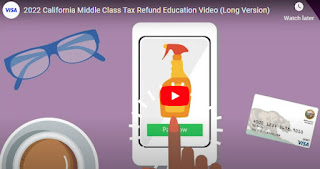For COVID relief, both the federal government and some state governments had funds for individuals/households. Congress created Economic Impact Payments (recovery credits) which were specified as not taxable and states followed that. Some states such as California had additional relief such as the Golden State Stimulus payments where were labeled as a one-time tax refund and available only to individuals below $75,000 of income or who received certain aid. California law (R&T 17131.11) was clear the funds were not taxable for California. For federal purposes, as a tax refund they were not taxable and even if not truly a tax refund, they likely fell under the general welfare exclusion to be non-taxable.
Last summer some state lawmakers created additional grants or refunds likely due to a surplus and increased gasoline prices hurting some individuals. California enacted the Better for Families Tax Refund (AB 192, Chapter 51, 6/30/22). This is also called the Middle Class Tax Refund (MCTR) on the FTB website (it's not clear where that name came from).
The preamble to the bill states that "existing law authorizes various forms of relief for low-income Californians." The relief provided though is available to married couples or head-of-household filers with 2020 income (AGI) up to $500,000 or single up to $250,000. These are not low-income levels because those high levels represent less than 2% of the California population. In addition to being below the stated AGI levels per the 2020 return, recipients had to have filed their 2020 return by 10/15/21 (before AB 192 was enacted) and be a California resident for six or more months of 2020 and not be eligible to be claimed as a dependent.
AB 192 is very clear that the "refund" is not taxable in California (R&T 17131.12(a)). While it sounds like a non-taxable refund for federal, there is a provision in AB 192 at Welfare & Institutions §8161(d) that states that the payment "shall not be a refund of an overpayment of income taxes ..."
So, perhaps it is not a non-taxable tax refund (although some bill language makes it sound like it is a refund of various California taxes, but why deny it then to someone without a need to file a 2020 California income tax return; everyone in CA certainly pays a variety of taxes including renters who indirectly pay a lot of property taxes, as well as sales and excise taxes).
Does the general welfare exception apply to make the MCTR non-taxable? The IRS describes this income exclusion as requiring the income recipient to satisfy the following (see Information Letter 2019-0024):
1. funds paid per a government program - met
2. not a payment for services - met
3. for promotion of the general welfare meaning it is based on need - I think not met
How can funds given to about 97% of Californians be a needs-based program? How can payment given to people well above the federal poverty line be based on need? How can $400 given to a married couple with $499,000 of income or $200 if single with $249,000 of income be based on need? Well, it would appear that the general welfare exception doesn't apply - the refunds/grants are taxable for federal purposes.
The FTB must have reached the same conclusion because they have stated that they are and will be issuing 1099-MISC to anyone receiving an MCTR or $600 or more. Of course, even if someone received a payment under $600, it is still taxable despite not receiving a 1099. Also note that these are Form 1099-MISC for miscellaneous payments rather than 1099-G for a refund of income tax paid (which makes sense because you could get the payment even if no income tax was owed in 2020).
Oddities:
1. Why were these funds given to people who don't need them? And it is not just the funds, but the costs of issuing so many "refunds."
2. Why were the funds not available to people who do need them, such as people with income below the filing threshold so did not file a 2020 return by 10/15/21? (these folks also lost out on the Golden State Stimulus if they did not file a 2020 return by 1015/21)
3. Why did AB 192 include a law change to say that the "refund" is not an income tax refund?
4. Why do California lawmakers want residents to give some of their payments to the federal government?
5. What about the reality that higher income individuals who get a refund under $600 won't have a 1099-MISC and may just forget to report it on their return, versus the lower-income folks getting a 1099-MISC that they must report? Now the amount might not cause a federal liability for low income taxpayers, but it is likely to result in some tax owed by many recipients.
All recipients should note what they received and put it in their tax records so all recipients report it on their 2022 or 2023 return (refunds are issued in Nov 2022 through January 2023).
For more:
- My 7/10/22 post on some MCTR issues.
- FTB websites on the MCTR - here and here












